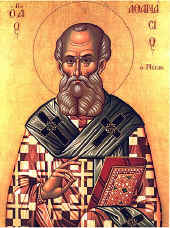Athanasius, Bishop of Alexandria,
Theologian, Doctor
d. 2 May 373
 Outside the pages of the New Testament itself, Athanasius is probably the man
to whom we chiefly owe the preservation of the Christian faith. He was born around AD
298, and lived in Alexandria, Egypt, the chief centre of learning of the Roman
Empire.
Outside the pages of the New Testament itself, Athanasius is probably the man
to whom we chiefly owe the preservation of the Christian faith. He was born around AD
298, and lived in Alexandria, Egypt, the chief centre of learning of the Roman
Empire.
In 313 the Emperor Constantine issued the Edict of Milan, which changed Christianity from a persecuted to an officially favoured religion. About six years later, a presbyter (elder, priest) Arius of Alexandria began to teach concerning the Word of God (John 1:1) that "God begat him, and before he was begotten, he did not exist." Athanasius was at that time a newly ordained deacon, secretary to Bishop Alexander of Alexandria, and a member of his household. His reply to Arius was that the begetting, or uttering, of the Word by the Father is an eternal relation between Them, and not a temporal event. Arius was condemned by many bishops of Egypt, and went to Nicomedia, from which he wrote letters to bishops throughout the world, stating his position.
The Emperor Constantine undertook to resolve the dispute by calling a council of bishops from all over the Christian world. This council met in Nicea, just across the straits from what is now Istanbul, in the year 325, and consisted of 317 bishops. Athanasius accompanied his bishop to the council, and became recognized as a chief spokesman for the view that the Son was fully God, co-equal and co-eternal with the Father.
The party of Athanasius was overwhelmingly in the majority. (The western, or Latin, half of the Empire was very sparsely represented, but it was solidly Athanasian, so that if its bishops had attended in force, the vote would have been still more lopsided.) It remained to formulate a creedal statement to express the consensus. The initial effort was to find a formula from Holy Scripture that would express the full deity of the Son, equally with the Father. However, the Arians cheerfully agreed to all such formulations, having interpreted them already to fit their own views. Finally, the Greek word "homo-ousios" (meaning "of the same substance, or nature, or essence") was introduced, chiefly because it was one word that could not be understood to mean what the Arians meant. Some of the bishops present, although in complete disagreement with Arius, were reluctant to use a term not found in the Scriptures, but eventually saw that the alternative was a creed that both sides would sign, each understanding it in its own way, and that the Church could not afford to leave the question of whether the Son is truly God (the Arians said "a god") undecided. So the result was that the Council adopted a creed which is a shorter version of what we now call the Nicene Creed, declaring the Son to be "of one substance with the Father."
No sooner was the council over than its consensus began to fall apart. Constantine had expected that the result would be unity, but found that the Arians would not accept the decision, and that many of the orthodox bishops were prepared to look for a wording a little softer than that of Nicea, something that sounded orthodox, but that the Arians would accept. All sorts of compromise formulas were worked out, with all shades of variation from the formula of Nicea.
In 328, Alexander died, and Athanasius succeeded him as bishop of Alexandria. He refused to participate in these negotiations, suspecting (correctly as it turned out) that once the orthodox party showed a willingness to make reaching an agreement their highest priority, they would end up giving away the store. He defended the full deity of Christ against emperors, magistrates, bishops, and theologians. For this, he was regarded as a trouble-maker by Constantine and his successors, and was banished from Alexandria a total of five times by various emperors. (Hence the expression "Athanasius contra mundum," or, "Athanasius against the world.") Eventually, Christians who believed in the Deity of Christ came to see that once they were prepared to abandon the Nicene formulation, they were on a slippery slope that led to regarding the Logos as simply a high-ranking angel. The more they experimented with other formulations, the clearer it became that only the Nicene formulation would preserve the Christian faith in any meaningful sense, and so they re-affirmed the Nicene Creed at the Council of Constantinople in 381, a final triumph that Athanasius did not live to see.
Athanasius is regarded as one of the Eight Great Doctors (Teachers) of the Undivided Church. The list includes four Latin (Western) Doctors (Ambrose, Jerome, Augustine, and Pope Gregory the Great), and four Greek (Eastern) Doctors (Athanasius, John Chrysostom, Basil the Great, and Gregory of Nazianzus -- not to be confused with Gregory of Nyssa, the brother of Basil).
Acknowledgements:
Text adapted from James Kiefer's Christian Biographies
Image from Orthodox Icon Gallery